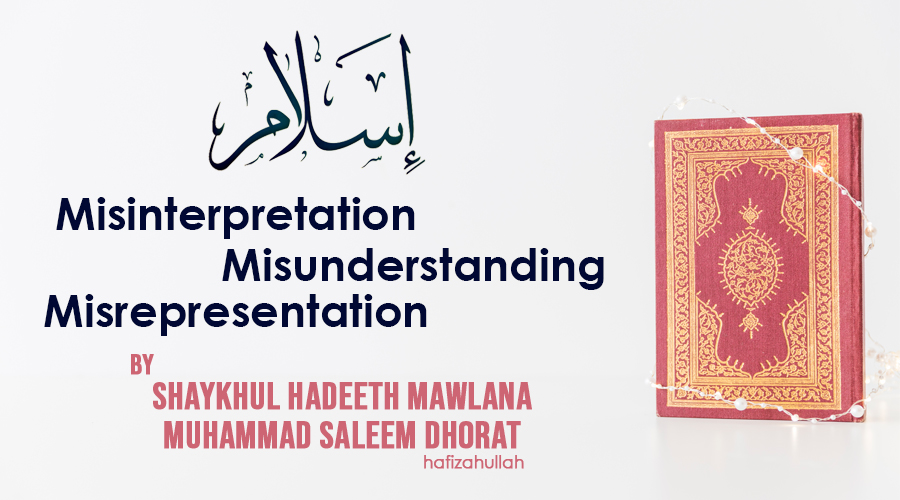
Islam – Misinterpretations. Misunderstandings. Misrepresentations
Allāh سُبْحَانَهُ وَ تَعَالَى sent Ambiyā (Prophets) for the guidance of mankind. They invited people towards goodness and virtue and warned them to renounce evil. Some fortunate souls accepted his invitation and entered the circle of believers. Others rejected their call and remained non-believers. Among the non-believers were two groups: those who recognised the truth but rejected it and misinterpreted it, and those who did not get the opportunity to recognise and understand the reality of the true message because they were under the influence of those who had already rejected the message. The vast majority of non-believers fell into the second category. This pattern has repeated itself throughout history.
History also shows us that the first group, bent on rejecting the truth despite knowledge, has always attempted to misguide the second group through misinterpretation and distortion. Sadly, this is what happened during our beloved Prophet صلى الله عليه وسلم.’s lifetime. A tiny minority, Abū Jahl and the like, who thoroughly understood the reality of Islām, denied it and portrayed Islām to the masses as something alien and evil. In spite of this minority’s acknowledgement of the truth of the message brought by Rasūlullāh سُبْحَانَهُ وَ تَعَالَى, personal interests swayed them to reject it and oppose the Prophet صلى الله عليه وسلم. They made it their goal to churn out propaganda against him to prevent people from getting a chance to get close and judge the Prophetic message for themselves.
As a result of this hate campaign carried out by a handful of influential individuals bent on distorting the truth, it was inevitable that more neutral people, who made up the masses, would misunderstand the true message of Islām. The majority of people remained ignorant of the reality of Islām, not understanding and therefore not accepting it, and merely followed their leaders. So while the minority were occupied with misinterpretation, the majority were left to their misunderstandings. If we carefully study the environment we are in, can we not conclude that we are in a similar situation? The non-Muslims are divided into two groups: the majority have become the victims of misunderstanding through the misinterpretation of a handful of people who control the media. The noble character, the exemplary life and the beautiful teachings of the beloved of Allāh سُبْحَانَهُ وَ تَعَالَىare being distorted and seeds of misunderstanding about the Dīn (Religion) of Allāh, Islām, are being planted into the hearts and minds of the masses.
This is not surprising, for history bears testimony that this has always been the case. However, the similarity between the time of Rasūlullāh s and our own age ends when we carefully assess the lives of the Muslims and Rasūlullāh سُبْحَانَهُ وَ تَعَالَى and his Companions performed the duty of representing Islām perfectly, whereas Muslims today are failing in their duty to give a correct picture of Islām. Because the Companions رضي الله عنه gave a correct representation of Islām, misunderstandings were dispelled at every step and people flocked towards the true religion. Our fault lies in not making a proper attempt to eradicate misunderstandings that are being sown in people’s minds throughout the world. Instead of representing Islām properly we are actually misrepresenting it. We are falling short in our duty to learn about Islām, practice it and convey it to others. We are failing the whole world when we fail to be true ambassadors of Islām.
How do we start representing Islām correctly? The answer is simple: study and learn the teachings of Islām, put them into practice and convey them to others verbally and practically. As a principle, we must keep the following guideline of Rasūlullāh s in mind all of the time:
- Fear Allāh wherever you are.
- Follow a bad deed with a good deed, it will wipe out (the bad deed).
- Deal with people with the best of manners. (Tirmidhī)
So the first thing we need to remember is to fear Allāh سُبْحَانَهُ وَ تَعَالَى wherever we are. In every aspect of our lives, we must adopt taqwā by fulfilling the Rights of Allāh سُبْحَانَهُ وَ تَعَالَىand the rights of His creation. If we ever slip and commit a bad deed, then:
- We should follow it up with such good deeds that the negative spiritual and social effects of the bad deeds are wiped out.
- It is also essential that we deal with people, Muslims and non-Muslims alike, with the high morals and good character taught by our Merciful Prophet صلى الله عليه وسلم.
Implementing these three directives will inshā’allāh make us spiritually strong and enable us to interact with non-Muslims without compromising our own beliefs and practices. We will then be in a position to offer non-Muslims the opportunity to see the true picture of Islām.
When our misrepresentation ceases, the forces of misinterpretation will no longer be able to make headway and will automatically lose their grip. No matter how hard they try to convince the world that Muslims are bad people, the sublime character and approach of ordinary Muslims – our greatest anti-propaganda device – will tell another story



